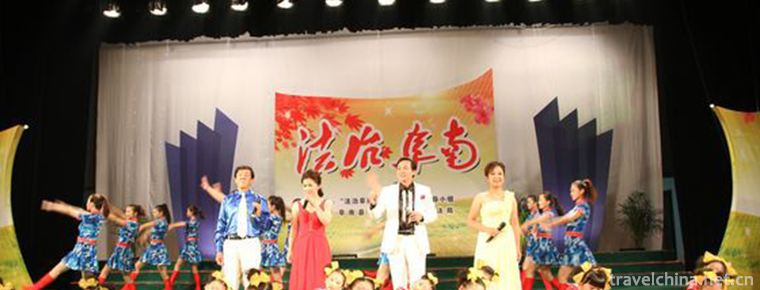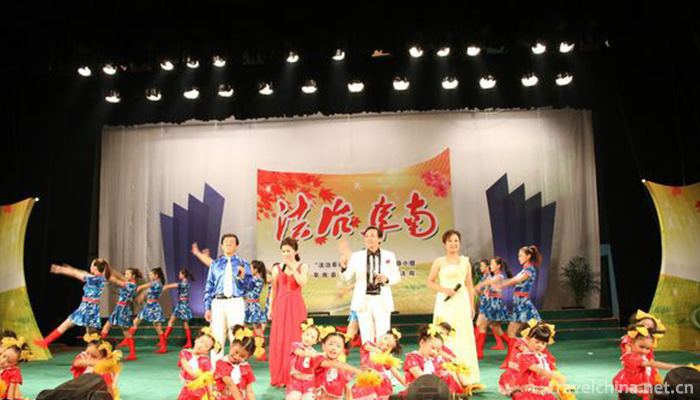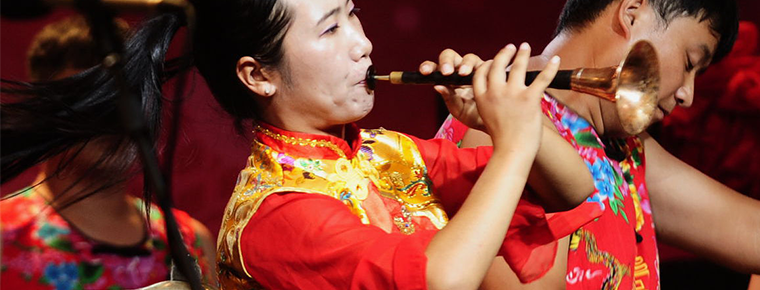2018-12-12

- By ChinaWiki.net
- Chinese Edition
- 2019-05-03
Haizi Opera
Hezi Opera is one of the traditional operas in Anhui Province. It was named after the pronunciation of the word "sea". It is popular in some areas of Anhui and Henan. The aria can be divided into two categories: main tune and floral tune. The more popular traditional plays are "Beating Peach Blossoms", "Standing on the Wall of Flowers", "The King's Divorce from His Wife" and so on.
On May 23, 2011, the "Hezi Opera" declared by Funan County of Anhui Province was listed in the third batch of national intangible cultural heritage list with the approval of the State Council.
Brief history of drama
Because the singing line is named after the pronunciation of the word "sea". It is popular in Funan, Yingshang, Linquan, Huaibin, Gushi, Shangcheng and Xixian in Northwest Anhui. Jiaqing and Daoguang were formed in Qing Dynasty. The vocal tunes can be divided into two categories: the main tunes are old-fashioned tunes, Hi-wa-zi and Bitter-wa-zi; the main tunes are six or seventy such as , , , . tradition
There are more than one hundred operas, such as this one, Folk Opera and three minor operas. The more popular ones are "Beating Peach Blossoms", "Standing Flower Wall", "The Emperor's Divorce from His Wife" and so on. Before liberation, gongs and drums were used to accompany them, and silk and bamboo instruments were added after liberation.
Hezi Opera, also known as Kezi Opera, Hezi Opera and Hazi Opera, is named for its beginning of the aria with "cough" or "ah" as the tune, and also for the function word "cough" as the tune between the lines. At the same time, because of its simple props and clothes, a flower basket can be fitted with a complete set of wardrobes, walk through villages and lanes, draw ground for the "platform" can open gongs to sing, so it is also known as flower basket opera, floor flutter cage, lantern twist opera, ground slippery, folk song troupe, etc., Xixian County is also known as "Niang Dang demon", popular in decoration, business, Gu, Xie, Huaixian County and Anhui Fuyang, Luan area. Originated in Gushi and Shangcheng area, the performing arts based on folk floor lantern operas absorbed brothers'operas developed and evolved. It was formed in the middle of Qing Dynasty and has a history of more than 200 years.
After liberation, Hezi Opera gained the attention of the Party and the government.
Founded in 1958, the Funan Hi Opera Troupe averaged more than 280 performances a year in the 1950s and 1960s.
From 1978 to 1981, there were more than 300 performances in the year, which greatly satisfied the people's thirst for cultural life.
For various reasons, the Funan Hi Opera Troupe was abolished in 1982, and the activities of the non-governmental groups were rapidly shrinking, and there were few successors. Funan Hezi Opera is facing a serious survival crisis.
In the 21st century, the county committee and county government have intensified their efforts to protect cultural heritage, and Funan Hezi Opera has received the focus of attention.
artistic characteristics
Music
The music system of Hezi Opera consists of singing and percussion.
The main part of the aria is the slab tune, supplemented by the tune plate, the chorus of the bang tune, the interlude of percussion music, the trinity of singing, bang and playing. Hezi Opera's opera music, also known as miscellaneous tunes, is a direct use of folk dance "Lantern" music, a total of more than 30 kinds, commonly used are Fengyang tune, color tune, long-term work, open door tune and so on.
The band consists of three or five people.
The representative plays of Hezi Opera are "Little Family" and so on.
The main theatre troupes are Luo Chengwudanggang's troupes in Huangchuan County.
form
Hezi Opera has a variety of performances. Sometimes it plays on the terrace and grass terrace. Sometimes it plays on the floor and sings and pulls lights.
The so-called "singing and pulling lamp", commonly known as "dew lamp", is that in the new lunar month, the theatre troupe in this place continued to perform day and night performances, while the sun did not come out and rushed to another place to perform.
When the theater troupe left, the audience arranged in battle and firecrackers were fired to deliver the play, which was called "light sending". The people who took over the theatre also set up to welcome the theatre, called "receiving the lights". The friendship between artists and peasants has been enhanced.
There is also an old rule in Chen Hu's Hezi Opera. Whenever the opera begins, a running headlamp is used as a cushion before the main performance. The jargon is "Jump and Add Officials". Maybe we should create a warm scene to arouse the audience's favor. In feudal society, opera performers were regarded as the "gatekeepers" of the lower class in the eyes of noble gentry.
In the years of famine, Chen Hu artists have no choice but to live a hungry and cold life with props as a sign of begging for food. After liberation, the artists turned over, became the masters of the country politically and had enough food and clothing in life.
After the Third Plenary Session of the Eleventh Central Committee of the Communist Party, many artists also lived in new tile houses. With the improvement of people's material and cultural life, Chen Hu's Hi Zi Opera is also improving artistically.
In 1984, the County Amateur opera tune, the performance of the folded opera "Exploring the Kiln" won an excellent performance award.

Ask a Question
Your email address will not be published.



0 Questions